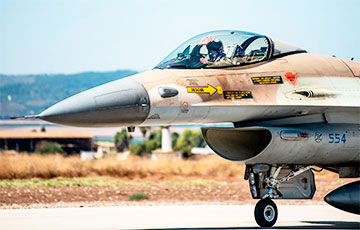Israeli Air Force Major: We Dreamed Of An Aerial Battle, But Iranian Planes Scurried Off To The East
- 17.06.2025, 15:00
- 4,936

The Israeli military spoke of air superiority, but warned against underestimating the enemy.
For many Air Force pilots, the opportunity to fly in the skies of Iran and attack its nuclear facilities and circle unimpeded in the skies over Tehran seemed like a pipe dream. Maj. N. serves as part of a McDonnell Douglas F-15 Eagle fighter air group that has attacked sites in Iran. According to the pilot, the dream came true, but not completely: he never managed to engage the enemy in the air, wrote "Details".
The Israeli Air Force's successes do not necessarily indicate the weakness of the Iranian army, but rather Israel's readiness for different scenarios, says Major N. "We have dreamed of flying into Iran for years. But I envisioned something different," the pilot admits.
Major is 31, married, with a child. For years, he says, the Air Force has been preparing for the need to attack Iran. Scenarios, targets and weaponry have changed over the years, but the target of the attack - Iran - has never been off the agenda at Air Force headquarters over the past two decades. For many Air Force pilots, the possibility of flying through Iran's skies and attacking its nuclear facilities, its surface-to-surface missile system, and circling unimpeded over Tehran's skies just under their watch seemed like a pipe dream.
"We were prepared to face a much more effective defense than what we faced today in Iran," says Major N. He speaks of the Air Force's superiority in Iran, but without capstone: "Iran has a powerful army. Even today it has powerful capabilities, and we must avoid underestimating the enemy."
"We spent a very long time preparing for an attack on Iran under different scenarios. In the end, everyone worked well. All of our units worked together in such a way that we were able to damage the Iranian defense capabilities at such an early stage, hitting them hard," adds N.
"The intelligence we are getting is just crazy," stresses the pilot. - 'Almost nothing surprises us on a mission. The level of intelligence the Air Force gets from all the intelligence agencies is at an extremely high level."
The pilot said his squadron spotted Iranian fighter jets taking off. Everyone was ready and waiting for a fight. The Israeli Air Force has practiced many scenarios involving threatening fighter jets and aerial combat with enemy aircraft. For Major N., as for every fighter pilot in the IAF, air combat with enemy aircraft is the most eagerly awaited mission. Pilots strive for it from the first day of training. "There isn't a single pilot who doesn't dream of air combat. When we saw Iranian Air Force planes taking off, there was even a feeling of slight joy," says the major. But, he says, very soon came a sense of disappointment: "They were scared of us and flew east."
Major N. argues that at the tactical level, fighting a sovereign state and an organized army, as opposed to fighting terrorist organizations operating among civilians, is simpler: the Air Force attacks military targets, avoiding harming uninvolved civilians. "In Iran, things are much clearer," he says. - It is a country with a powerful, significant and organized army...We never seek to harm civilians, nor do we seek to fight the Iranian people, but rather a regime that threatens the future of the State of Israel."
The combat pilot also said that when IAF planes circle over Iran, pilots sometimes spot Iranian ballistic missile launches aimed at Israeli territory. "We see launches into Israel. We see interceptions and, unfortunately, rocket landings in the city limits," said Maj. N. "The destruction of each surface-to-surface missile means one less rocket will fly toward Israel... We understand what we are doing there and why."











